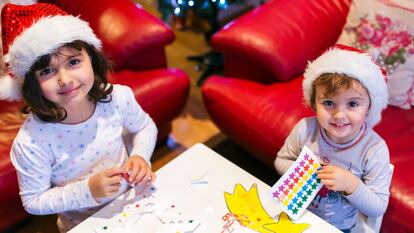My kid knows the truth about Santa Claus. What do I do to keep them from telling their siblings?
When a child discovers who is behind this Christmas tradition, they may feel angry, deceived or disappointed. Talking to them without downplaying their feelings and making them part of magic can help

Christmas season is upon us, and in most households with small children, everything is prepared with great excitement for the arrival of Santa Claus. Many generations of kids have nervously experienced the magic of Christmas Eve. However, sooner or later the truth always emerges: the jolly old elf is actually mom and dad. And not everyone reacts in the same way. Some boys and girls may feel frustrated, deceived and disappointed, and if they have younger siblings who still do not know, they may want to share the news with them. So how can you get them to keep the secret?
“The age at which children discover the truth about Santa Claus varies a lot, because it depends on the number of children, the family situation and, above all, the school environment,” explains child psychologist Carmen Romero, whose Instagram account has more than 137,000 followers. “In general,” she continues, “it is between 7 and 10 years old.” Child and adolescent psychologist Lorena González adds: “Only children usually take longer to discover the truth, but those who have older siblings or cousins generally find out sooner, from the remarks they hear when they play with them.”
“If the kid doesn’t ask, there is no need to give them information that will ruin the Christmas magic,” states Romero. “But when they do ask, it’s because they know something, and it is usually to confirm what they already found out,” she adds. For the psychologist, the best thing fathers and mothers can do is be honest, “even if it hurts them to see that their children are growing, especially to be able to establish trust.” “When it becomes clear that the older sibling knows and there are children at home who still believe, it is a good idea to include them as your magical assistants,” continues Romero. According to this psychologist, it is best to explain to them that, just like they experienced that thrill, it is important that they respect the secret so that the little ones can enjoy it too. “They should understand that a new stage in their life is beginning, one in which they are included in that of adults.”
Facing the question with the truth
When it is clear that a child already knows that that there is no Santa Claus and they ask directly, Lorena González recommends telling them the truth, in a loving and honest way. “If they are still small, it is better not to make any changes after the conversation; that is, to keep putting the presents under the tree, writing the letter together, leaving some milk and cookies. In short, do everything that you used to do before the revelation, with the aim of prolonging and maintaining their affection for the holiday.”
The older sibling must be reminded that they, too, used to believe in Santa Claus. “I would ask them, for example, to respect and keep the tradition for their sibling,” says González. “It’s usually not difficult,” she continues, “because children love to keep secrets; you can tell them that now it is their turn to be part of the magic.” “Something they really like is if you make them accomplices, honorary elves, asking them what they think their younger sibling might like, what present you could get them,” González explains. In short, the important thing is to involve them. “They could even put the gifts under the tree, eat the cookies and drink the milk.”
It may be the case that some children feel disappointed “when they discover that they have been told a world of fake magic for years,” Romero points out. If they get angry, the psychologist continues, you must explain to them that it is all part of the Christmas charm: “That we have been doing it for years, for generations, and always in a very simple way and as a show of love for the children, so that they can experience all the Christmas magic.” “Especially in these cases, it is important to listen to how they feel, validate their emotions and make them feel understood,” adds González. She also recommends that parents devote as much time as their children need to talk about the issue and not make light of their frustration: “They are disappointed. It’s normal.”
Sign up for our weekly newsletter to get more English-language news coverage from EL PAÍS USA Edition
Tu suscripción se está usando en otro dispositivo
¿Quieres añadir otro usuario a tu suscripción?
Si continúas leyendo en este dispositivo, no se podrá leer en el otro.
FlechaTu suscripción se está usando en otro dispositivo y solo puedes acceder a EL PAÍS desde un dispositivo a la vez.
Si quieres compartir tu cuenta, cambia tu suscripción a la modalidad Premium, así podrás añadir otro usuario. Cada uno accederá con su propia cuenta de email, lo que os permitirá personalizar vuestra experiencia en EL PAÍS.
¿Tienes una suscripción de empresa? Accede aquí para contratar más cuentas.
En el caso de no saber quién está usando tu cuenta, te recomendamos cambiar tu contraseña aquí.
Si decides continuar compartiendo tu cuenta, este mensaje se mostrará en tu dispositivo y en el de la otra persona que está usando tu cuenta de forma indefinida, afectando a tu experiencia de lectura. Puedes consultar aquí los términos y condiciones de la suscripción digital.








































